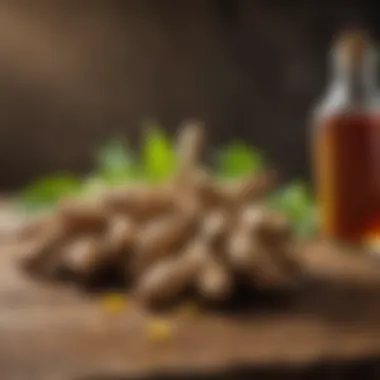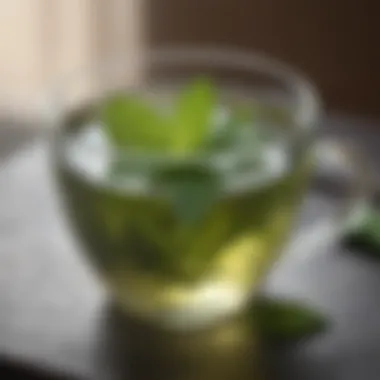Discover the Natural Remedies: Herbs for Dry Cough Relief


Well-Being Overview
In the realm of health and wellness, delving into the realm of herbs for dry cough relief offers a unique perspective on natural remedies. The intersection of traditional healing methods and modern applications provides a fascinating terrain for exploration. Understanding the efficacy of herbs in alleviating dry cough symptoms unveils a world of holistic healing that is gaining significant traction in contemporary wellness practices.
Nutrition for Nourishment
Physical Wellness
Furthermore, complementing herbal remedies with a focus on physical wellness forms a holistic approach towards combating dry cough. Regular exercise routines not only enhance cardiovascular health but also boost immunity, aiding in the body's resilience against respiratory issues. Valuable tips on maintaining healthy eating habits serve as pillars of strength, offering essential nutrients that support respiratory health. Emphasizing the significance of consistent physical activity illuminates the symbiotic relationship between movement and immune function, illustrating the innate connection between physical well-being and respiratory health.
Mindfulness & Self-Care Practices
Amidst the exploration of herbs for dry cough relief, the integration of mindfulness and self-care practices emerges as a critical component of holistic well-being. Delving into mindfulness techniques cultivates a sense of present-moment awareness, fostering inner calm and reducing stress—an essential factor in bolstering the immune system. Implementing self-care rituals for rejuvenation not only nurtures the body but also nourishes the mind, creating a harmonious balance between work and relaxation. By weaving mindfulness and self-care into the fabric of daily routines, individuals can cultivate resilience and inner peace, vital elements in navigating health challenges effectively.
Mental Health Matters
In the realm of wellness, mental health occupies a paramount position, influencing every facet of our well-being. Understanding the intricacies of mental health empowers individuals to cultivate strategies that enhance mental well-being, creating a sturdy emotional foundation. Coping mechanisms for stress and anxiety play a pivotal role in maintaining psychological equilibrium, laying the groundwork for overall health and vitality. By prioritizing mental health alongside physical wellness, individuals can embark on a holistic journey towards optimal well-being, leveraging the transformative power of herbs for dry cough relief in conjunction with mental fortitude.
Understanding Dry Cough
Dry cough is a common respiratory symptom characterized by a persistent, irritated throat and a cough that does not produce phlegm. In the context of this article, understanding dry cough is crucial as it sets the foundation for exploring herbal remedies for its relief. By delving into the characteristics, causes, and impact of dry cough on well-being, readers can grasp the significance of seeking natural alternatives for symptom management.
Characteristics of Dry Cough
The key characteristics of dry cough include a tickling sensation in the throat, a persistent urge to cough, and the absence of phlegm expectoration. Unlike productive coughs, which help clear the airways, dry coughs can be dry and irritating, leading to discomfort and disruption during daily activities. Understanding these distinct features aids in determining the most effective treatment approaches for alleviating dry cough symptoms.


Causes of Dry Cough
Dry cough can result from various factors, such as respiratory infections, allergic reactions, irritants like pollutants or smoke, or underlying health conditions like asthma or gastroesophageal reflux disease (GERD). Identifying the root cause of a dry cough is essential for developing targeted treatment plans that address the underlying issue, promoting lasting relief and improved respiratory health.
Impact of Dry Cough on Well-Being
The persistent nature of a dry cough can significantly impact an individual's well-being by causing sleep disturbances, physical discomfort, and social embarrassment. Chronic dry coughs may lead to fatigue, anxiety, and reduced quality of life if left untreated. Understanding how dry cough affects overall well-being underscores the importance of finding effective remedies to minimize symptoms and enhance the individual's quality of life.
Exploring Herbal Remedies
In this crucial section of the article, we delve into the significance of exploring herbal remedies for dry cough relief. Herbal remedies have been a cornerstone of traditional medicine for ages, offering natural and effective solutions to common ailments. By focusing on herbal alternatives, individuals can harness the healing power of nature to alleviate dry cough symptoms without relying on conventional pharmaceuticals. The exploration of herbal remedies in this article aims to educate readers on the diverse options available, bridging the gap between traditional practices and modern healthcare approaches.
Traditional Herbs for Dry Cough
Licorice Root
Licorice Root stands out as a prominent herbal remedy for dry cough due to its potent properties. This herb is renowned for its soothing effects on respiratory issues, making it an indispensable choice for addressing cough symptoms. The key characteristic of Licorice Root lies in its ability to reduce inflammation in the throat and lungs, providing relief from irritation and facilitating easier breathing. One unique feature of Licorice Root is its natural expectorant qualities, assisting in expelling mucus and phlegm, thereby clearing airways effectively. Despite its many advantages, Licorice Root should be used with caution by individuals with hypertension due to its potential to elevate blood pressure.
Thyme
Thyme emerges as another valuable herb for combatting dry cough, thanks to its therapeutic properties. This herb is prized for its antimicrobial and antispasmodic attributes, making it a popular choice in herbal medicine. The key characteristic of Thyme lies in its ability to relieve coughing spasms and target bacteria causing respiratory infections, aiding in cough suppression and recovery. One unique feature of Thyme is its high content of essential oils, such as thymol, which exhibit strong antibacterial and antifungal properties. While Thyme offers numerous benefits for respiratory health, individuals allergic to herbs in the mint family should exercise caution when using this herb.
Marshmallow Root
Marshmallow Root plays a significant role in herbal medicine for dry cough management due to its demulcent and anti-inflammatory effects. This herb is valued for its ability to coat and soothe the throat, providing a protective layer against irritation and cough-induced discomfort. The key characteristic of Marshmallow Root is its mucilage content, which forms a gel-like substance when mixed with water, ideal for soothing throat irritation and reducing dry cough symptoms. One unique feature of Marshmallow Root is its throat-coating properties, which help in alleviating cough reflex sensitivity and promoting overall throat health. Despite its advantages, individuals with diabetes should monitor their blood sugar levels when consuming Marshmallow Root due to its potential to lower blood sugar.
Modern Applications of Herbal Medicine


Echinacea
Echinacea holds a pivotal role in modern herbal medicine for its immune-boosting properties. This herb is recognized for its ability to enhance the body's defense mechanisms, making it a popular choice for combating respiratory infections and alleviating cough symptoms. The key characteristic of Echinacea lies in its stimulation of immune cells, promoting a robust immune response to fight off pathogens causing cough and cold. One unique feature of Echinacea is its diverse bioactive compounds, such as flavonoids and polysaccharides, which contribute to its anti-inflammatory and antimicrobial effects. While Echinacea offers various advantages for immune support, individuals with autoimmune disorders should seek medical advice before using this herb.
Ginger
Ginger stands out as a versatile herb in modern herbal medicine, renowned for its anti-inflammatory and antioxidant properties. This herb is prized for its ability to soothe the throat, reduce coughing episodes, and promote respiratory health. The key characteristic of Ginger lies in its gingerol content, which exhibits potent anti-inflammatory effects, aiding in reducing throat irritation and cough intensity. One unique feature of Ginger is its warming nature, which helps in clearing congestion, improving circulation, and boosting overall immunity. While Ginger offers numerous benefits for respiratory well-being, individuals on blood-thinning medications should moderate their intake due to its potential interaction.
Peppermint
Peppermint emerges as a refreshing herb in modern herbal medicine, valued for its cooling and soothing effects on respiratory ailments. This herb is esteemed for its menthol component, which acts as a natural decongestant, offering relief from cough-related congestion and sinus discomfort. The key characteristic of Peppermint lies in its ability to calm respiratory muscles, reducing cough sensitivity and promoting clear breathing. One unique feature of Peppermint is its aromatic essence, which can alleviate nausea and improve overall respiratory function. Despite its advantages, individuals with gastroesophageal reflux disease (GERD) should consume Peppermint cautiously to prevent potential aggravation of symptoms.
Benefits of Using Herbs for Dry Cough Relief
This section of the article delves into the myriad benefits of utilizing herbs for dry cough relief. Herbal remedies offer a holistic approach to managing cough symptoms, addressing the root cause of the condition while providing gentle and natural relief. By incorporating herbs into cough management, individuals can experience reduced reliance on pharmaceuticals and minimize potential side effects associated with conventional treatments. The benefits of using herbs for dry cough relief include enhanced respiratory health, improved immune function, targeted symptom alleviation, and overall well-being enhancement.
Preparing Herbal Remedies
In the realm of holistic healing for dry cough relief, preparing herbal remedies plays a pivotal role. This section delves into the essential practices and methods of harnessing the natural benefits of herbs to alleviate dry cough symptoms effectively. By focusing on preparing herbal remedies, individuals can access the potent healing properties of medicinal plants in a concentrated and tailored manner, enhancing the efficacy of treatment.
Herbal Infusions and Teas
Herbal infusions and teas are prominent in traditional medicine for addressing dry cough. Infusions involve steeping herbs in hot water to extract their medicinal properties. Teas offer a soothing and easy method to ingest herbs, allowing for quick absorption into the body. The combination of hot water and herbs creates a comforting elixir that can help relieve throat irritation and promote respiratory health. Herbal infusions and teas provide a gentle yet effective way to access the healing benefits of herbs for individuals seeking natural remedies.
Herbal Steam Inhalation


Herbal steam inhalation is a practice that involves inhaling herbal-infused steam to alleviate congestion and respiratory discomfort associated with dry cough. This method helps to hydrate the airways, reduce inflammation, and loosen mucus, making it easier to expel phlegm. By combining hot water with selected herbs such as eucalyptus or peppermint, individuals can experience immediate relief from cough and congestion symptoms. Herbal steam inhalation offers a refreshing and natural approach to clearing the respiratory passages and enhancing overall respiratory well-being.
Herbal Tinctures and Extracts
Herbal tinctures and extracts provide a concentrated form of herbal medicine that can be easily ingested to combat dry cough symptoms. Tinctures involve extracting medicinal compounds from herbs using alcohol or glycerin, creating a potent solution with long shelf life. Extracts are strong, alcohol-free preparations that offer a highly absorbable and convenient way to benefit from herbal properties. By incorporating herbal tinctures and extracts into treatment regimens, individuals can target dry cough symptoms effectively and efficiently, harnessing the full healing potential of herbs in a practical and potent form.
Safety and Precautions
Safety and precautions play a vital role in the realm of herbal remedies for dry cough. Prioritizing safety measures ensures the well-being and health of individuals seeking relief from this bothersome condition. It is imperative to exercise caution when delving into herbal remedies, as even natural substances can interact with individuals differently. By highlighting safety protocols, users can navigate the world of herbs with confidence and awareness. Understanding potential risks and precautions can help in preventing adverse reactions and promoting a safe healing journey.
Consulting a Healthcare Provider
Consulting a healthcare provider is a crucial step before embarking on any herbal treatment regimen for dry cough. Healthcare professionals possess the expertise to offer personalized advice tailored to an individual's health status and medical history. Engaging with a healthcare provider ensures that the chosen herbal remedies align with existing treatments and do not pose any contraindications. Furthermore, healthcare providers can monitor progress, address any concerns, and suggest adjustments to optimize the effectiveness of herbal remedies. Their guidance provides invaluable support in promoting holistic well-being and successful management of dry cough.
Potential Side Effects
Exploring potential side effects associated with herbal remedies for dry cough is essential for informed decision-making. While herbs offer natural healing properties, some individuals may experience side effects or allergic reactions. Being aware of possible adverse effects empowers individuals to monitor their body's response and take appropriate measures if needed. Common side effects may include digestive issues, allergic reactions, or interactions with existing medications. By recognizing and understanding potential side effects, individuals can approach herbal remedies with caution and proactively address any unexpected reactions.
Dosage and Administration Guidelines
Adhering to dosage and administration guidelines is critical for the safe and effective use of herbal remedies for dry cough. It is essential to follow recommended dosages meticulously to prevent overdosing or underdosing, both of which can impact the remedy's efficacy. Understanding the proper administration methods, such as teas, tinctures, or steam inhalation, ensures maximum benefit from the selected herbs. Factors like age, weight, and health conditions influence the appropriate dosage levels, emphasizing the importance of personalized guidance. By adhering to dosage and administration guidelines, individuals can harness the full potential of herbal remedies while prioritizing their health and well-being.
Conclusion
In the realm of healing herbs for dry cough relief, embodying a sense of closure and direction is paramount. The conclusion serves as the anchor, consolidating the essence of the entire discourse on herbal remedies for alleviating dry cough symptoms. It encapsulates the significance and relevance of integrating these natural solutions into one's wellness routine, offering a holistic approach to managing respiratory ailments.
The importance of the conclusion lies in its ability to synthesize the vast array of information presented throughout the article. It acts as a compass, guiding readers towards a practical application of the knowledge acquired, steering them towards informed decision-making when selecting and using herbal remedies for dry cough relief. The conclusion also serves as a catalyst for action, encouraging readers to explore further and adapt their approach to health and well-being.
One key element highlighted in the conclusion is the comprehensive nature of herbal remedies and their versatility in addressing various aspects of dry cough. By delving into traditional herbs and their modern counterparts, the conclusion underscores the rich tapestry of options available to individuals seeking natural remedies for respiratory issues.
Moreover, the benefits encapsulated in the conclusion extend beyond symptom relief. They resonate with the ethos of holistic healing, emphasizing the interconnectedness of mind, body, and spirit in the pursuit of optimal health. By highlighting the benefits of herbal remedies, the conclusion fosters an appreciation for nature's healing balm and promotes a paradigm shift towards sustainable, natural healthcare solutions.
Lastly, the conclusion touches upon considerations that readers should bear in mind when embarking on their herbal remedy journey. It sheds light on dosage guidelines, potential side effects, and the importance of consulting healthcare providers for personalized recommendations. This emphasis on safety and precaution ensures that readers approach herbal remedies for dry cough with vigilance and awareness, safeguarding their well-being in the process.



